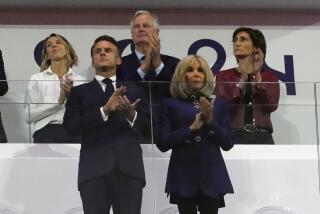French Voters Turn to Right, Reject Socialists
PARIS — An alliance of moderate right-wing parties routed the governing Socialist Party of President Francois Mitterrand in the first round of France’s parliamentary elections Sunday, assuring the right of an overwhelming majority in the National Assembly after the second round of voting March 28.
The outcome will install a hostile “cohabitation” government for the aging president’s last two years in office.
Before the vote, Mitterrand, 76, vowed to stay on until his term expires in 1995, no matter what the result of Sunday’s election. However, the size of the right-wing victory, aided by a weaker-than-expected showing by ecologist parties, far exceeded even the gloomiest Socialist predictions in pre-election polls and will likely increase pressure on Mitterrand to resign.
“If the results hold up after the second round of voting next week,” said right-wing opposition leader Alain Jupe, “the president (Mitterrand) needs to face up to the consequences.”
Candidates from the two main center-right parties, the Rally for the Republic and the French Democratic Union, captured 40% of Sunday’s vote, compared with only 19% for the demoralized Socialists. Based on these results, political experts predict that the right wing is in position to take as many as 480 of the 577 seats in the National Assembly after the runoff vote next Sunday.
Such a result could leave the Socialists with as few as 60 seats in Parliament.
“This would be the most right-wing National Assembly in all our history,” declared Socialist Party Secretary Laurent Fabius. “The left faces a Parliament with a crushing right-wing majority that threatens our social programs. We must mobilize in the second round to build a dam against the tidal wave from the right.”
The overwhelming right-wing victory will force Mitterrand to choose the country’s next prime minister from among the winning parties, most likely the Rally for the Republic, which placed the most individual candidates in the runoffs.
Considered to be the most likely choices are Edouard Balladur and two-time former Prime Minister Jacques Chirac. Chirac, leader of the neo-Gaullist Rally for the Republic, has said he is not interested in repeating the experience of serving in a “cohabitation” government opposite Mitterrand, as he did in 1986-88 before being defeated by Mitterrand in the presidential election of 1988.
However, the 1986-88 “cohabitation” occurred while the right wing had only a four-vote majority in the National Assembly. The huge majority anticipated as a result of Sunday’s election may change the picture, compelling Chirac to rethink his strategy.
Other possible choices for prime minister are former President Valery Giscard d’Estaing and Republican Party leader Francois Leotard.
The biggest surprise of the Sunday vote, which had a relatively high abstention rate for France of 31%, was the poor showing of the combined slate of candidates presented by the two main ecologist parties. Pre-election polls had shown that the ecologists might win as much as 17% of the vote, an outcome that would have assured them an important role in the new government.
But the ecologists polled only 8%, leaving them with no chance of winning even one seat in the new Parliament. The low “green” vote was a major disappointment for the Socialists, who had viewed the ecologists as potential allies for the second round of voting.
Another surprise not reflected in pre-election polls was a stronger-than-expected performance by the extreme right National Front party headed by Jean-Marie Le Pen. National Front candidates appeared likely to qualify for more than 60 runoff elections and thus gain several seats in the new Parliament.
“It shows that the National Front has become a political force to which the French voters can turn as a recourse,” Le Pen said Sunday night.
The ringing rejection of the Socialist Party, buffeted in recent years by charges of political corruption and damaged by its inability to do anything about France’s 10%-plus unemployment rate, was interpreted by both right- and left-wing camps as a “sanction” against 12 years of Socialist rule under Mitterrand.
Among the important Socialist leaders caught up in the right-wing landslide were Foreign Minister Roland Dumas, who faces almost certain defeat in the town of Sarlat, and former Prime Minister Michel Rocard, who faces a difficult runoff election in his suburban Paris home district against Republican Party candidate Pierre Cardo. In the first round of voting Sunday, Cardo outpolled Rocard by 38% to 28%.
If Rocard loses in next Sunday’s runoff in the western suburbs of Paris, it will be a serious blow to his ambitions to replace Mitterrand as the Socialist presidential candidate in 1995.
Rocard, 62, recently called for the renovation of the Socialist Party and the creation of a new broad-based political movement that would include ecologists and progressive Communists.
Rocard reacted bitterly to the anti-Socialist vote. “I’m sad,” Rocard said. “Whatever errors took place, we didn’t deserve this treatment. We have seriously regressed. It proves that we must change.”
More to Read
Sign up for Essential California
The most important California stories and recommendations in your inbox every morning.
You may occasionally receive promotional content from the Los Angeles Times.










